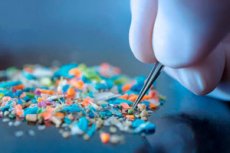PVCs and other microplastics found in blocked arteries
Last reviewed: 07.06.2024

All iLive content is medically reviewed or fact checked to ensure as much factual accuracy as possible.
We have strict sourcing guidelines and only link to reputable media sites, academic research institutions and, whenever possible, medically peer reviewed studies. Note that the numbers in parentheses ([1], [2], etc.) are clickable links to these studies.
If you feel that any of our content is inaccurate, out-of-date, or otherwise questionable, please select it and press Ctrl + Enter.

Atherosclerosis is a cardiovascular disease that occurs when the inner walls of arteries become clogged with accumulations of cholesterol and fats known as atherosclerotic plaques.
Researchers estimate that about 50% of all deaths in Western society are caused by this condition.
People with atherosclerosis are at higher risk for cardiovascular disease in general, such as coronary heart disease. They also have an increased risk of developing other conditions such as diabetes, kidney disease and obesity.
Now researchers from the University of Campania Luigi Vanvitelli in Italy have discovered another potential problem with arterial plaques - the presence of microplastics in themtitle="A Detailed Review Study on Potential Effects of Microplastics and Additives of Concern on Human Health - PMC">.
The researchers also found that people with microplastics in arterial plaques were 4.5 times more likely to have a heart attack, stroke, or death within 34 months of plaque removal surgery than those without plastics in their plaques.
What are microplastics?
Small pieces of plastic less than 5 millimeters long are considered microplastics.

"Microplastics are tiny plastic particles that are either manufactured - like microbeads and glitter - or formed by the breakdown of plastic products, such as clothing and food packaging, in the environment," explained Rebecca FuocoRebecca Fuoco, director of science communication at the Institute for Green Science and Policy, who was not involved in the study.
"We can absorb them with food and water, inhale them from the air and absorb them through the skin," she noted.
Past studies show that humans and animals can be exposed to microplastics through contaminated tap water and bottled watertitle="Occurrence of Microplastics in Tap and Bottled Water: Current Knowledge - PMC">Fish, food saltstitle="Consuming microplastics? Investigation of commercial salts as a source of microplastics (MPs) in diet - PMC">And honey.
Past studies have linked microplastics in the body to an increased risk of hormone disruption, immune dysregulationtitle="Impacts of microplastics on immunity - PMC">And negative effects on gut microfloratitle="PET microplastics affect human gut microbiota communities during simulated gastrointestinal digestion, first evidence of plausible polymer biodegradation during human digestion - PMC">A.
Microplastics and cardiovascular health
According to Dr. raffaele Marfella, professor at the Department of Medical and Surgical Sciences of the University of Campania Luigi Vanvitelli and lead author of the current study, many studies have observed the presence of microplastics and nanoplasticstitle="Nanoplastics and Human Health: Hazard Identification and Biointerface - PMC">In human tissues, but so far this is the first observation of a link to cardiovascular disease.
"The interest came from our research related to the study of atherosclerosis," Marfella said. "Specifically the increase in cardiovascular events in patients with no or few risk factors led us to consider and look for other conditions that may influence the progression of atherosclerosis and therefore cardiovascular events."
"In this context, we thought about pollution, especially the huge amount of plastic that pollutes our planet," he continued. "So we first wondered whether plastic, in the form of micro- or nanoplastics, could also be damaging our arteries and whether the presence of such a biologically inert material could alter the health of our blood vessels."
Measurable microplastic in 60% of the plaques studied
For this study, Marfella and his team recruited 304 people who had undergone carotid endarterectomy. The scientists examined the removed blood vessel plaques for the presence of microplastics and nanoplastics.
The researchers found measurable amounts of polyethylene in the plaques of about 60% of the study participants. They also found polyvinyl chloride in the plaques of 12% of the participants.
Risk of heart attack, stroke, death is 4.5 times higher
Researchers also successfully tracked 257 study participants for 34 months. They found that study participants with microplastics in their plaques were 4.5 times more likely to have a heart attack, stroke, or death in the 34 months following plaque removal surgery, compared to those without plastics in their plaques.
"I hope that the disturbing message from our study will trigger the consciousness of citizens, especially governments, to finally realize the importance of the health of our planet. To formulate a slogan that can unify the need for health for people and planet, 'plastic-free is healthy for the heart and the earth,'" he suggested.
The study is published in new England Journal of Medicine
